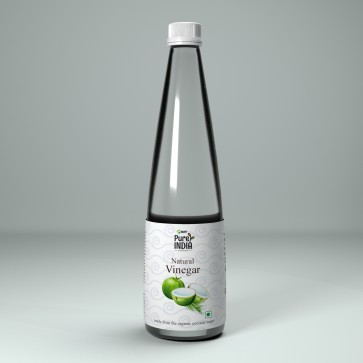NATURAL COCONUT VINEGAR
NATU RAL COCONUT VINEGAR
BOTANICAL NAME: COCOS NUCIFERA
NATU RAL COCONUT VINEGAR
500ML
BOTANICAL NAME: COCOS NUCIFERA
Vinegar is a liquid consisting of about 5–20% acetic acid (CH3COOH), water, and other trace chemicals, which may include flavorings. The acetic acid is produced by the fermentation of ethanol by acetic acid bacteria. Vinegar is now mainly used as a cooking ingredient, or in pickling. As the most easily manufactured mild acid, it has historically had a great variety of industrial, medical, and domestic uses, some of which (such as its use as a general household cleaner) are still commonly practiced today.
Commercial vinegar is produced either by a fast or a slow fermentation process. In general, slow methods are used in traditional vinegars where fermentation proceeds slowly over the course of a few months or up to a year. The longer fermentation period allows for the accumulation of a non-toxic slime composed of acetic acid bacteria. Fast methods add mother of vinegar (bacterial culture) to the source liquid before adding air to oxygenate and promote the fastest fermentation. In fast production processes, vinegar may be produced between 20 hours to three days.
USES AND MEDICAL PROPERTIES
CULINARY
Vinegar is commonly used in food preparation, in particular in pickling processes, vinaigrettes, and other salad dressings. It is an ingredient in sauces such as hot sauce, mustard, ketchup, and mayonnaise. Vinegar is sometimes used while making chutneys. It is often used as a condiment. Marinades often contain vinegar. In terms of its shelf life, vinegar's acidic nature allows it to last indefinitely without the use of refrigeration.
Several beverages are made using vinegar, for instance Posca. The ancient Greek oxymel is a drink made from vinegar and honey, and sekanjabin is a traditional Persian drink similar to oxymel. Other preparations, known colloquially as "shrubs", range from simply mixing sugar water or honey water with small amounts of fruity vinegar, to making syrup by laying fruit or mint in vinegar essence for several days, then sieving off solid parts, and adding considerable amounts of sugar. Some prefer to boil the shrub as a final step. These recipes have lost much of their popularity with the rise of carbonated beverages, such as soft drinks.
FOLK MEDICINE AND RESEARCH
Many traditional remedies and treatments have been ascribed to vinegar over millennia and in many different cultures,although no medical uses are verified in controlled clinical trials. Some folk medicine uses have side effects that represent health risks.
DIET AND DIABETES
Small amounts of vinegar (approximately 25 g of domestic vinegar) added to food, or taken along with a meal, were proposed in preliminary research to reduce the glycemic index of carbohydrate food for people with and without diabetes.
Some preliminary research indicates that taking vinegar with food increases satiety and reduces the amount of food consumed.
ANTIMICROBIAL
The growth of several common food borne pathogens sensitive to acidity is inhibited by common vinegar (5% acetic acid).
RETAIL PACKING AVAILABLE :500ML
| WEIGHT | 500.ML |
|---|




